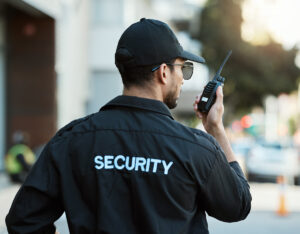
Businesses of all types rely on security personnel to maintain safety, deter threats, and create a welcoming atmosphere for employees and visitors alike. While armed guards may be required in certain high-risk locations, unarmed security professionals play an equally critical role across a wide range of industries. Their ability to adjust to different business environments—each with unique expectations, challenges, and risks—is what makes them so valuable. Let’s explore how unarmed security guards adapt to different business environments and what makes their approach so effective.
Understanding the Environment
The first step for any unarmed security guard is understanding the specific environment they are working in. Whether it’s a retail store, corporate office, hospital, or warehouse, each setting has its own priorities. For instance, a retail environment may focus heavily on loss prevention and customer service, while a hospital may require a calm, compassionate approach to handling patients and visitors. Guards begin by assessing the site layout, identifying potential vulnerabilities, and learning company protocols so they can act in alignment with the client’s security goals.
Adapting to Retail Settings
In retail environments, unarmed guards must balance vigilance with customer service. They monitor entrances and exits, deter theft, and respond to incidents—all while maintaining a friendly, approachable demeanor that doesn’t intimidate shoppers. These guards often work closely with management to prevent losses and maintain an orderly environment without disrupting the customer experience. Their interpersonal skills are as critical as their observational abilities in these busy public spaces.
Corporate Offices and Business Parks
In office settings, unarmed security guards act as the face of professionalism. They are often the first point of contact for employees, clients, and visitors, providing both security and assistance. Their duties may include monitoring access control systems, conducting badge checks, and managing visitor sign-ins. Because these environments typically prioritize discretion and confidentiality, guards must maintain composure and professionalism at all times, blending seamlessly into the corporate culture.
Healthcare Facilities
When stationed at hospitals or medical centers, unarmed security guards focus on de-escalation, compassion, and safety. They help ensure that only authorized individuals access certain areas, assist with patient transport when necessary, and respond calmly to emotionally charged situations. These environments often require specialized training in crisis management and communication, as guards may encounter patients in distress or family members under stress. Adaptability in healthcare security means balancing authority with empathy.
Industrial and Warehouse Environments
Unarmed guards in industrial or warehouse facilities must adapt to physically demanding conditions and a heightened focus on safety. They may monitor entry points for vehicles and personnel, check shipping logs, or conduct patrols to prevent unauthorized access and potential accidents. Because these sites often operate 24/7, guards must be alert and capable of working independently during overnight or off-peak hours. Knowledge of occupational safety and emergency response protocols is particularly valuable in this setting.
Hospitality and Event Venues
At hotels, resorts, and event centers, unarmed guards play a key role in maintaining a welcoming yet secure atmosphere. They assist with crowd control, respond to guest inquiries, and handle disturbances discreetly. The ability to blend security awareness with top-tier customer service makes these guards indispensable. Their adaptability allows them to manage everything from quiet overnight hotel shifts to large, high-energy gatherings.
The Importance of Communication and Training
No matter the environment, communication is the foundation of effective unarmed security work. Guards must clearly relay information to supervisors, law enforcement, and employees when incidents occur. Regular training helps them adapt to changing protocols, technology, and risks—ensuring that they’re always prepared for the specific needs of their assigned location. Many companies also cross-train their guards to handle different types of sites, enhancing flexibility and overall effectiveness.
Get the Best Security for Your Business With Unarmed Security Guards
The ability of unarmed security guards to adapt to different business environments demonstrates their professionalism, awareness, and value across industries. From retail stores to healthcare facilities, their role goes beyond basic surveillance—they provide reassurance, uphold safety standards, and represent the businesses they serve with integrity. In every setting, adaptability is their greatest asset, ensuring that security is both effective and seamlessly integrated into the daily operations of each unique workplace.
CES is Dedicated to Serving Our Community
Since opening in 1975, we have been committed to serving businesses in the District of Columbia, Maryland, and Virginia. Our values include proactive communication, honesty, reliability, and quality. We also believe in paying unparalleled attention to detail, no matter which service you require us to provide.
Our services include the following: professional security teams for permanent, temporary, emergency, and rapid-response support; around-the-clock patrols and management attention; concierge and hospitality staffing; and a dedicated mobile patrol service with associated staffing. Contact us for a free professional consultation today! Call 443-471-7000. Don’t forget to follow us on social media through Facebook, Twitter, and LinkedIn!
